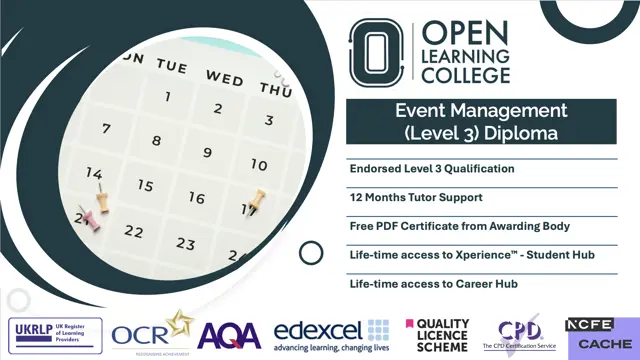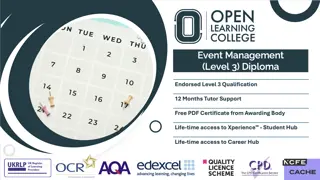
Event Management (Level 3)
Distance Learning Course, featuring tutor support and AI assistance, available online or as a study pack option.
Open Learning College
Summary
Funding options available on our website
- QLS & OPA - Free
- Exam(s) / assessment(s) is included in price
- Tutor is available to students
- TOTUM card included in price What's this?
Add to basket or enquire
Overview
Embark on a transformative learning journey with the UK’s most innovative home study provider, offering courses designed to unlock your true potential and facilitate the career change you desire. Access our distance learning courses directly from anywhere, anytime, and acquire industry-recognised Professional Qualifications essential for advancing in your career.
Specifically, explore the flexible and convenient Event Management (Level 3) course, an ideal way to gain a diploma qualification. Whether you aim for further education, improved job prospects, or expanded knowledge, this comprehensive course allows you to prepare thoroughly for exams or careers through home study. Plus, it’s structured to be accessible and beneficial even if you have no prior knowledge in Event Management.
Being an event manager is a demanding but rewarding role. It can bring unexpected challenges, but also huge satisfaction.
As well as being organised, as an event planner you will also need communication, negotiation, and diplomacy skills. Knowing who to approach and how, can make event management successful.
Event management courses are highly valued. This is a course that allows you to study a broad base of event management and planning.
Within the 11 modules of this course, four main event types are covered:
- Conferences and meetings for corporate clients
- Private events including birthday parties, weddings, christenings, naming ceremonies and other celebrations
Exhibitions, including trade exhibitions - Destination management involves organising travel itineraries for clients and their guests, as well as managing all other travel arrangements
- You’ll be pleased to know that this course is up to date with event trends and markets, GDPR, contract, terms, insurance as well as photographic and audio-visual requirements.
As you complete the online event management home study course, you will look at choosing the right venue, caterers, entertainment and photographer. You will also create event proposals, as well as look at action plans and task lists, so that everything that needs to be done before, during and after the event, is completed.
Event planners will often run their own business, offering their services to private and corporate clients. There is one module dedicated to setting up your own business and how to move forward with your exciting business.
Achievement
Certificates
QLS & OPA
Digital certificate - Included
Open Learning College have undergone external quality checks to ensure that the organisation and the courses’ it offers meet a high standard. Regular reviews of our courses are carried out as part of the endorsement process.
The course depth and study has been benchmarked at Level 3 against level descriptors published by Ofqual.
Visit www.qualitylicencescheme.co.uk for more information.
1. You will receive your accreditation directly from QLS, once you have successfully completed your course (certification fees are included in the course fee).
2. You will receive the Open Pathway Accreditation Diploma (OPA.dip) from Open Learning College.
Course media
Resources
- Event Management Level 3 (QLS) Course -
Description
the Event Management (Level 3) course is divided into 11 modules.
Module 1: Introduction to event management
This introductory module provides a general overview of what it means to be an event planner and explores some of the main considerations and competencies required to successfully work in this sector. Specific areas covered include.
• What is an event management company?
• Event trends and the event market in the UK
• The role of the event planner
• Key competencies and skills
• Marketing your services
Module 2: Introduction to the Event Planning Process
This module introduces the construct of the event planning process and focusses on relevant considerations such as; Understanding the needs of the client and how to prepare your own event. Specific areas covered include.
• Understanding the needs to the client
• Planning your own event
• Preparing a proposal
• The itinerary and the event planner’s role
• Event planner code of ethics
Module 3: The venue
This module focuses on the process of choosing and organising an appropriate venue to suit your client’s needs and examines relevant considerations such as; types of venue, insurance and hiring marquees. Specific areas covered include;
• Choosing a venue
• Types of venue
• Booking the venue for the event
• Overnight accommodation
• Insurance
• Hiring marquees
• Site visits at venues
Module 4: Catering
This module examines the need for catering at an event and provides guidance on how to arrange and coordinate this process effectively through the focus on areas such as; receptions, wine and dietary requirements, Specific areas covered include;
• Choosing a caterer
• Catering options
• Receptions
• Quantities guidelines
• The running order of an event
• Dietary requirements
• Wine
• Other beverages
Module 5: Entertainment
This module looks at the relevance of implementing successful entertainment to suit the requirements of events and looks at numerous considerations of relevance such as, music, themes, and speeches. Specific areas covered include.
• Music
• Requirements for musicians, bands and DJs
• Speeches
• Toasts
• Extra touches to an event
• Entertainment budget planner
• Theming an event
• Flowers and the florist
• Locating and using other suppliers of party equipment
Module 6: Photographic and Audio-Visual Requirements
This module examines the role of an event planner in advising about how to engage a photographer, what to look for, when photographs should be needed and at what point they should be taken. Specific areas covered include;
• Photography
• Videography
• Video diary
• Webcams
• Visual projection
• Sound projection
Module 7: Staging the Event
After mainly focussing on event preparations, this module looks specifically at the actual staging of the event. The knowledge details an array of relevant considerations such as: staffing, registration and seating plans. Specific areas covered include;
• Getting organised
• Staffing an event
• Delegate packs
• Registration
• Clearing up
• Compiling lists of invitees
• Enclosures with invitations
• Receiving replies
• Seating plans
• International travel considerations
• Health and safety considerations
Module 8: Preparing Event Proposals
This module examines the importance for you as an event planner, to produce and maintain portfolios and proposals based on all the events that you have been involved with. Specific areas covered include;
• Creating an event portfolio
• The types and styles of portfolio
• The first meeting
• Creating an event proposal
• The importance of contractual obligations
• Contracts with suppliers
• Budgeting
• Negotiating with suppliers
Module 9: Marketing and Selling your Events Planning Service
This module is concerned with the importance of promoting and marketing your event planning services and details relevant guidance on how to do this effectively. Specific areas covered include.
• Analysing your business strengths and weaknesses
• Developing a marketing campaign
• Undertaking market research
• Marketing strategy
• Marketing action plan
• Preparing to negotiate a contract
• During negotiations
• Closing negotiations and follow-up
Module 10: Setting up your Business
This module examines the process of setting up your own event planning business and details important guidance on issues such as; company structure, premises, and fees. Specific areas covered include.
• Company structure
• Company names
• Company advice
• Premises
• Deciding on your fee
• Fixed and variable costs
Module 11: Preparing your own Task Lists and Action Plans
This concluding module aims to equip learners with effective techniques on planning their time and organising event planning responsibilities through the exploration of task lists and action plans. Specific areas covered include.
• Introduction to task lists
• First meeting
• Second meeting
• Third meeting
• Final meeting
• Action plan for the day
• After the event
Who is this course for?
Target Audience
- The Event Management course caters to a wide spectrum of individuals passionate about the event industry.
- It's ideal for aspiring event planners seeking a comprehensive understanding of event organisation and management.
- This course suits individuals eager to venture into the dynamic world of event planning, whether as freelance event organisers, corporate event planners, or professionals aiming to work in event management agencies.
- Moreover, it accommodates individuals already in the field, offering them a chance to refine their skills, expand their knowledge base, and enhance their proficiency in executing successful events across various industries and contexts.
Requirements
Course Requirements
- The good news is that no prior learning knowledge or experience is essential to take this course. This course is openly available to anyone wishing to learn more about Event Management (Level 3) and would like to take part in a highly rewarding distance learning study course.
- We believe that everyone should have the opportunity to expand their knowledge and study further, so we try to keep our entry requirements to a minimum.
- You have the freedom to start the course at any time and continue your studies at your own pace for a period of up to 12 months from initial registration with full tutor support.
Career path
If you have high organisation and interpersonal skills and thrive in a fast-paced environment, consider a career as an event manager
Questions and answers
Reviews
Currently there are no reviews for this course. Be the first to leave a review.
Legal information
This course is advertised on reed.co.uk by the Course Provider, whose terms and conditions apply. Purchases are made directly from the Course Provider, and as such, content and materials are supplied by the Course Provider directly. Reed is acting as agent and not reseller in relation to this course. Reed's only responsibility is to facilitate your payment for the course. It is your responsibility to review and agree to the Course Provider's terms and conditions and satisfy yourself as to the suitability of the course you intend to purchase. Reed will not have any responsibility for the content of the course and/or associated materials.



